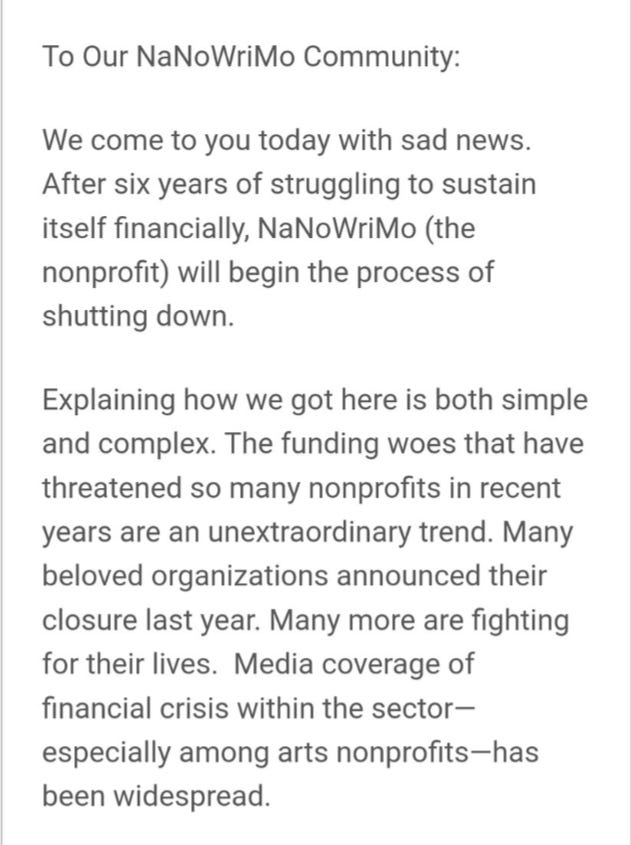The fall of NaNoWriMo: how controversy and crisis ended a writing revolution
For a generation of writers, National Novel Writing Month—better known as NaNoWriMo—was more than a challenge. It was a movement. Every November, writers across the globe pledged to draft 50,000 words in 30 days, cheered on by a vibrant community, countless write-ins, and an ethos that said: just write the story. Myself included took part in it a few times and used it to force myself to finish a few of my books. I can say I only officially ‘won’ it once but it was a good excuse to crack on with writing.
Now, after 25 years, the organisation behind NaNoWriMo is shutting down for good.
The official reason? Financial difficulties. But for many, the beginning of the end was not found in a balance sheet, but in a scandal that broke in late 2023—one that shattered the trust of the very community NaNoWriMo was built to serve.
The rise of a writing empire
NaNoWriMo began in 1999 as a modest experiment in creative endurance. By 2005, it had launched the Young Writers’ Program (YWP), inviting children and teens into the fold. Teachers, librarians, and parents embraced the challenge as a gateway to creativity and confidence for young writers. Municipal Liaisons ran local events, forums thrived with camaraderie, and the NaNo community grew to encompass hundreds of thousands of participants across the world.
Over two decades, NaNoWriMo became a rare thing: a truly global grassroots writing community. And yet, in hindsight, the cracks were already there and as with everything that starts off good and noble, the evil and the wicked were drawn to it.
2023: the year everything changed
In late 2023, a firestorm erupted within the official NaNoWriMo forums. A long-standing moderator—referred to by the community as Moderator X—was accused of grooming minors through the Young Writers’ Program. According to numerous reports, this individual operated an adult website and allegedly directed teenagers to it. Even more troubling were claims that known predators had been granted access to the YWP forums, exposing children to online abuse.
These weren’t isolated whispers. Victims and whistleblowers allege they had submitted reports, screenshots, and complaints for years, only to be dismissed, silenced, or banned. Moderators and staff failed to act. It was only when victims escalated the matter to the FBI and launched a survivor-led site called Speak Out that the full horrifying extent of the situation began to emerge.
In response, NaNoWriMo’s Board of Directors shut down the forums, issued a public statement, and claimed (lied) that they had not been informed of the full scale of the abuse. They acknowledged receiving “hundreds of pages” of evidence in a short span—evidence their own team had failed to bring forward over the years.
It was a devastating reckoning for a community built on trust.
Pattern of poor decisions
While the 2023 revelations were by far the most serious, they weren’t the only signs of rot behind the scenes. In 2022, NaNoWriMo faced backlash for partnering with Inkitt, a company widely criticised for exploitative publishing practices. Though they eventually cut ties and consulted with SFWA’s Writer Beware, the damage to their reputation lingered.
Critics point to a pattern: bad decisions made without adequate oversight, followed by reactive apologies rather than proactive protections. From forum moderation failures to the slow response to abuse reports, it became clear that safeguarding was not given the priority it deserved.
And once trust is lost—especially where young people are concerned—it’s almost impossible to regain.
Financial collapse—or moral one?
In early 2025, NaNoWriMo officially announced it would begin winding down operations, citing financial unsustainability after six difficult years. On paper, it mirrors a wider trend of arts nonprofits struggling to stay afloat. But the timing, coming just months after a catastrophic failure in safeguarding, raises hard questions.
Would NaNoWriMo still be standing if the scandals of 2023 hadn’t broken? Was community support already dwindling long before the financial reality caught up? Or did the revelations simply accelerate a slow decline already in motion?
Whatever the answer, it’s clear that many former supporters walked away—not just because of finances, but because of betrayal.
Where do writers go from here?
Though the nonprofit is closing, the spirit of NaNoWriMo is likely to live on. Writers will still set November goals. Local groups will still meet up. Independent alternatives have already sprung up across Facebook, Discord, and other platforms. But the centralised, officially supported version of NaNoWriMo—the forums, the YWP, the grand annual campaign—is gone.
The organisation has issued its farewells, urging writers to “keep writing” and to support other arts nonprofits. But for many, this goodbye feels hollow, coming after so many ignored warnings and missed chances to protect the vulnerable.
A cautionary epilogue
NaNoWriMo showed us what a global writing community could look like. But it also serves as a warning: good intentions are not enough. Without transparency, accountability, and proper safeguarding, even the most cherished institutions can fall. We’re seeing it in other writing competitions as well with what is likely to be similar results.
As writers move on, they’ll take the lessons of NaNoWriMo’s rise and fall with them. The words will continue—but the trust will not be so freely given next time.
And perhaps that’s the real tragedy of NaNoWriMo’s final chapter. Not just that it ended, but how.







Goodness, I had like 7 wins in NaNoWriMo! (maybe more I can't remember). Here I thought the crash was due to politics. I didn't know the deeper story. Thanks for sharing and giving the world warning.
There are still sprinting sites and I'm in a group now for that. Writing alongside others helps us to stay on track. It's a shame about NaNo.
One of the lessons should be "Not everything needs a national group organizing it." People could write 50k words and post about it without salaried people distributing templates and logos. I suspect it's that lack of need for organizers that led to the infiltration by predators. With no real work needed, people could use the org as camouflage for their own agendas.
The SCA has the "Cascading Bureaucracy Meme" to warn against this tendency:
"We can, so we do. We do, so an officer must oversee the doing. The officer must report monthly, or we will lose our nonprofit status."